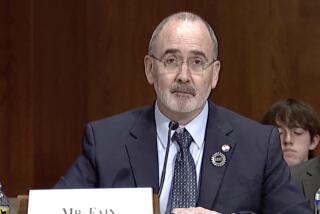A Time Warp for Those Who Love Weekends
- Share via
Alexander H. Pope, former Los Angeles county assessor, has written a paper, as yet unpublished, proposing that we drop one minute from each hour.
Pope is now managing partner of Mayer, Brown & Platt, a law firm, which evidently gives him time to ponder such notions.
He feels that we have not already adopted the 59-minute hour simply because we have a tendency to go on doing things the way we always have.
Time as a philosophical concept is beyond my understanding, though I have devoted much space to it. Perhaps the best definition I have ever heard of time is that it is what keeps everything from happening at once.
What got Pope to thinking about time, evidently, was the pleasure he got from that extra hour one Sunday morning in the fall after we had turned our clocks back. “I thought to myself,” he recalls, “how nice it would be if we could all do this more often.”
It then occurred to him that we could easily save ourselves time by doing it in increments--one minute off every hour. “Just cut the work week hours short by one minute each. Who could object to that? Most of us waste more time than that criticizing this week’s Raider quarterback selection or trying to remember the items on the shopping list we left on the kitchen table.”
Pope insists that the mathematics of his proposal is easy. “Having 59-minute hours for the five weekdays would save 120 minutes, enough for an extra hour not only Sunday morning but also on Saturday morning as well.”
Evidently he means to cut one minute from every hour of the day, not merely from the eight hours a day that most of us work. All right. So that means we save 24 minutes every day of the five-day work week, and by the weekend we have two extra hours to spend as we wish.
Although the timekeeping problem inherent in his idea seems overwhelming to me, Pope contends that it would be a simple challenge for our computerized society.
He foresees formidable objections from the Establishment, but he offers some curious historical footnotes to show that our timekeeping system is not necessarily indispensable.
“At the height of their power and influence, the Chinese emperors limited the use of clocks in China to the Imperial Court. It was not until the 18th Century that English clocks were accurate enough for ocean navigation. Just 100 years ago, the Japanese still used ‘natural hours’ (measured by the amount of daylight), which varied from day to day.”
In a purely philosophical vein he observes that “Shakespeare, Michelangelo, Mozart, Newton, Darwin and Freud produced their greatest works without the slightest reference to the number of minutes in an hour.”
I would say that Pope is assuming facts not in evidence. How do we know that all those fellows weren’t clock watchers, and put aside the old pen or chisel at the stroke of 5? Shakespeare, Michelangelo and Newton might have had to depend on the town clock, but watches were common in Mozart’s day and Darwin and Freud undoubtedly kept stem-winders in their vest pockets.
He concedes that there may be “workaholics” who love work and would resent giving up a minute of every work hour, but he offers a solution: “Let those who wish to work their full 60-minute hours during the day (do so), and subtract two minutes from each nighttime hour. This will allow them to get back to work almost one half-hour sooner, something they should love.”
One advantage, he points out, would be the number of new jobs necessitated by the changeover. Certainly it would render obsolete every clock and watch in the world, and make billions for the clock makers.
Pope is onto something in wanting to have more leisure time on Sunday mornings, but why doesn’t he just stay in bed a couple of hours more and leave time alone?
After all, Sunday football doesn’t usually begin on the tube until 10 a.m., and if he’s civilized, he can watch the game without getting out of bed. If he’s religious and wants to go to church, he can simply flip the switch to catch an evangelist.
I’d say that what the Raiders are going to do about their quarterback is a much more serious question.
More to Read
Sign up for Essential California
The most important California stories and recommendations in your inbox every morning.
You may occasionally receive promotional content from the Los Angeles Times.













